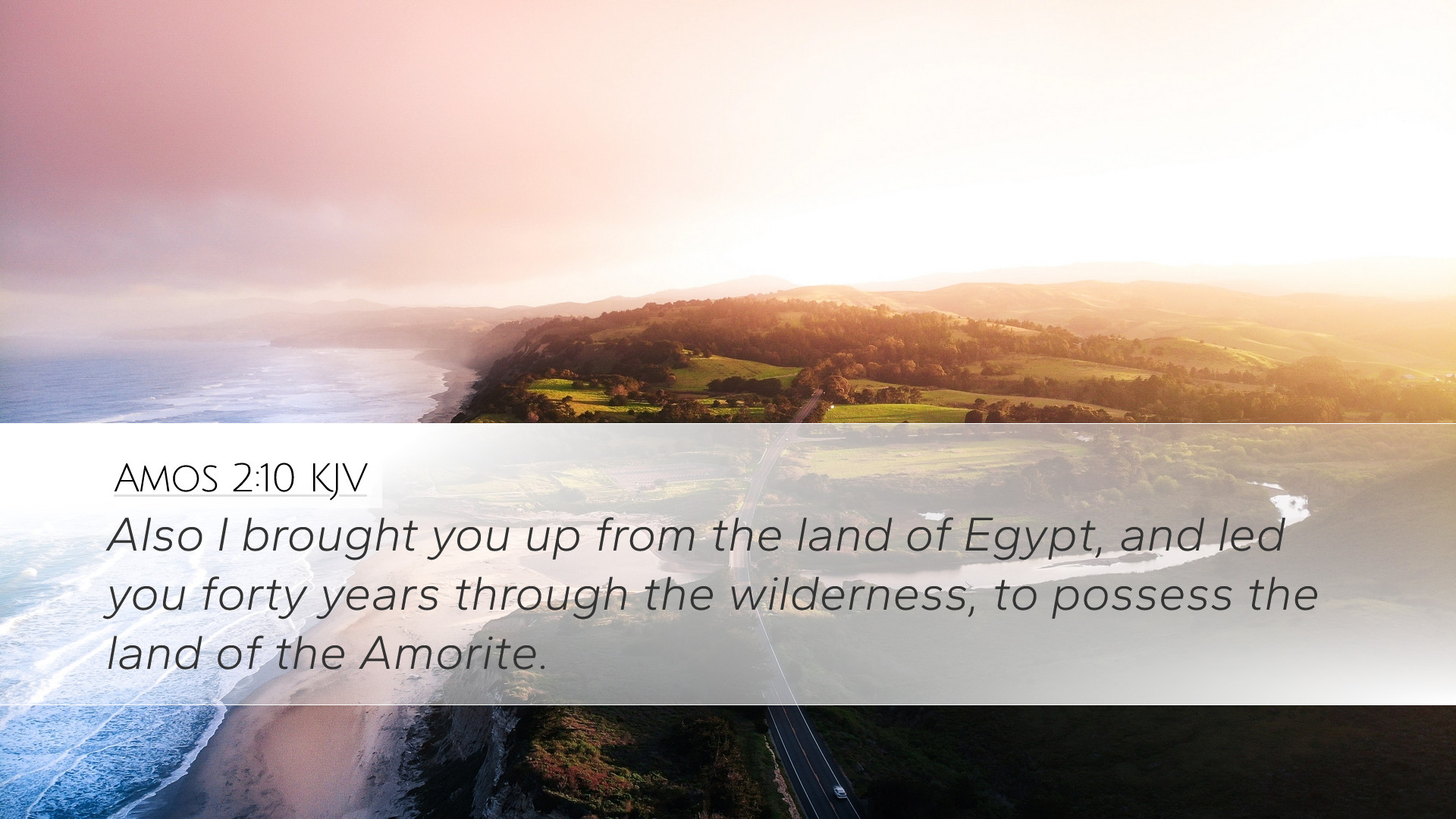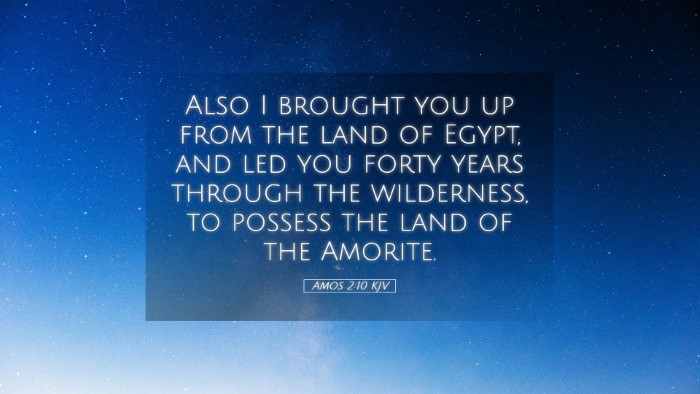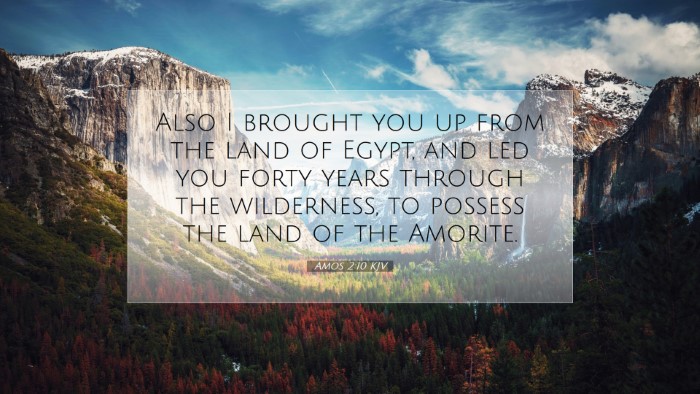Old Testament
Genesis Exodus Leviticus Numbers Deuteronomy Joshua Judges Ruth 1 Samuel 2 Samuel 1 Kings 2 Kings 1 Chronicles 2 Chronicles Ezra Nehemiah Esther Job Psalms Proverbs Ecclesiastes Song of Solomon Isaiah Jeremiah Lamentations Ezekiel Daniel Hosea Joel Amos Obadiah Jonah Micah Nahum Habakkuk Zephaniah Haggai Zechariah MalachiAmos 2:10
Amos 2:10 KJV
Also I brought you up from the land of Egypt, and led you forty years through the wilderness, to possess the land of the Amorite.
Amos 2:10 Bible Commentary
Amos 2:10 - Biblical Commentary
Bible Verse: Amos 2:10 (ESV) - "It was I who brought you up out of the land of Egypt and led you forty years in the wilderness, to possess the land of the Amorite."
Introduction
The verse Amos 2:10 serves as a reminder of God's historical acts of deliverance and guidance for His people. Through the prophet Amos, God articulates His profound relationship with Israel, recalling their origins and highlighting His continuous direction during a formative period in their history. The significance of this text extends to various theological themes, including God's sovereignty, covenant faithfulness, and the nature of remembrance in a community of faith.
Historical Context
The Book of Amos is set during a period of prosperity for Israel under Jeroboam II, but it is also a time rife with injustice, idolatry, and moral decay. Amos, a shepherd and farmer, is called by God to prophesy against the northern kingdom of Israel. His messages often emphasize social justice and religious integrity, urging the people to return to a right relationship with God.
Insights from Commentaries
Matthew Henry's Commentary
Matthew Henry emphasizes the importance of divine remembrance in Amos 2:10, highlighting that God recounts His salvific acts as a basis for Israel's accountability. Henry notes:
- "God recalls how He redeemed His people from oppression in Egypt, illustrating a fundamental aspect of their identity."
- "This historical reminder acts as both a comfort and a warning; it should lead them to gratitude and compliance with His will."
Albert Barnes' Notes on the Bible
Albert Barnes elaborates on the significance of the wilderness journey, suggesting it represents a period of testing and preparation. His insights include:
- "The forty years in the wilderness was not just a physical journey; it was a time of spiritual formation for Israel."
- "God's statement underscores His active role in leading them to the land of promise, reaffirming His commitment to their destiny."
Adam Clarke's Commentary
Adam Clarke provides a theological reflection on the relational aspects of God's deliverance.
- "Clarke notes that the Exodus serves as a profound demonstration of God’s mercy and faithfulness, contrasting sharply with the unfaithfulness of Israel."
- "He encourages readers to consider how their understanding of past deliverances inform their current relationship with God."
Theological Themes
1. God’s Sovereignty
Amos 2:10 illustrates God's absolute sovereignty over Israel's history. He actively intervened in their circumstances, guiding them from slavery to freedom and giving them a land of their own. This sovereignty is not merely abstract; it is integral to the identity of the people of God.
2. Covenant Faithfulness
This verse also sheds light on the covenantal relationship between God and Israel. God's action of bringing them out of Egypt is foundational—defining their identity as His chosen people. The mention of "the Amorite" emphasizes that their entrance into the promised land is rooted in God’s covenant promises and faithfulness.
3. The Importance of Remembering
Memory serves a vital role in the life of the believer. Amos calls Israel to remember their God-given identity. This reflection encourages modern readers to consider how their spiritual heritage impacts their present faith walk. Drawing on the past encourages future faithfulness.
Practical Applications
1. Reflection on Deliverance
Pastors and theologians can utilize this verse to lead congregations in reflecting on their own deliverances and the faithfulness of God in their lives. It invites a narrative of gratitude and encourages communal worship rooted in shared history.
2. Living Out God's Covenant
Amos 2:10 calls believers today to live as people who have been redeemed. This involves embodying justice and mercy in their communities, reflecting God's character in the world. Church leaders might preach on the implications of God's past actions for living a covenantal life today.
3. Emphasizing Spiritual Formation
The journey through the wilderness can serve as a metaphor for the spiritual growth and testing that believers endure. It illustrates that trials are often the precursor to blessings, enabling a deeper reliance on God.
Conclusion
Amos 2:10, through the insights of esteemed biblical commentators, urges believers to remember the profound acts of God in their history and to live accordingly. By understanding the theological implications and practical applications of this verse, they are better equipped to navigate their spiritual journeys and foster communities rooted in God's faithfulness.


